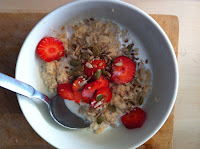It's a simple equation between calories consumed and calories expended and with many of us leading increasingly sedentary lives, the balance is shifting more and more towards over consumption. I've spent the majority of my life trying to get the balance right and only now, on the IF diet, do I finally feel I'm getting on top of it.
Of course, eating is just one manifestation of over consumption and with the recent launch of yet another iPhone, we witness the sad spectacle of the global community trapped in a never ending cycle of Stripping the planet's resources in the so called name of progress.
The problem is, the planet can't sustain this pace of development. We currently use the equivalent of 1.5 planets to provide us with the resources we require to sustain us at these levels. This means it takes the planet 1.5 years to regenerate the resources used by us in 1 year.
Current UN scenarios estimate that by 2050, if population growth and consumption trends don't change, we will need 3 planets to support us...... Clearly unsustainable. You can read further about the projections and what we can all do to reverse this trend, on the Global Footprint Network website.... Global Footprint Network
Nutrition tip of the day
Cocoa is not just a comforting bed time beverage but has great health benefits too. Now before I get into that, I want to stress that I'm talking about pure cocoa powder here and NOT hot chocolate which has added sugar...... And especially not the sort of hot chocolate you get in Starbucks with squirty cream and chocolate flakes on top!!!!
Ok, so we are talking 100% cocoa. Always look for a fair trade supplier such as Cadbury. Cocoa is an excellent natural source of powerful antioxidants, containing more in one cup than tea or red wine. Drinking cocoa can help fight heart disease and cancer and can also help fight the effects of ageing.
Cocoa is a good source of fibre, iron and magnesium but only contains 25 calories in a serving (you would need to add in the calories of the milk used)
 Cocoa also has antidepressant properties - containing phenethylamine, a neurotransmitter which lifts the mood. It also boosts endorphins and seratonin levels which are responsible for feelings of happiness.
Cocoa also has antidepressant properties - containing phenethylamine, a neurotransmitter which lifts the mood. It also boosts endorphins and seratonin levels which are responsible for feelings of happiness.
As if that wasn't enough, cocoa also reduces cholesterol, lowers blood pressure, reduces the risk of blood clots, boosts cognitive function and contains calcium and potassium.













